January 3, 2025
Air Date: January 3, 2025
FULL SHOW
SEGMENTS
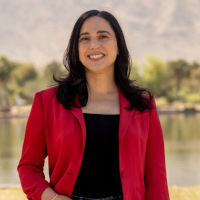
New Climate Champion in Congress
View the page for this story
Freshman U.S. Representative Yassamin Ansari, a Democrat representing Arizona’s 3rd district, puts climate at the top of her priority list. She joins Host Steve Curwood to reflect on her work with the UN on the Paris Climate Accord, discuss how extreme heat is affecting her constituents, and preview her climate aims in Congress. (11:21)
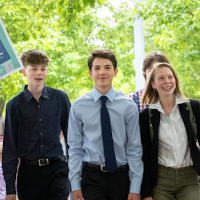
Montana Climate Win
View the page for this story
In a landmark 6 to 1 decision, the Montana State Supreme Court upheld a ruling that found young people, and by extension all people in Montana, have a constitutional right to a livable climate that state officials can’t ignore. Vermont Law and Graduate School Emeritus Professor Pat Parenteau explains to Host Steve Curwood how the plaintiffs presented their case and how the ruling could guide litigation in other states. (13:08)
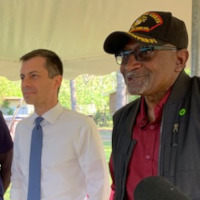
Last Call to Biden for Environmental Justice
View the page for this story
The African American residents of Shiloh, Alabama whose homes were flooded by a state highway expansion say they are still waiting for the full measure of environmental justice promised by the outgoing Biden Administration. EJ expert Dr. Robert Bullard of Texas Southern University joins Host Steve Curwood to tell the story. (07:30)
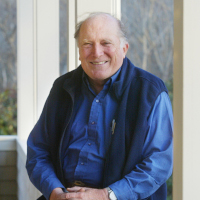
George Woodwell Tribute
View the page for this story
In 2024 the world lost a giant of climate science and eco activism, George Woodwell. Host Steve Curwood remembers this man who advised President Jimmy Carter on climate, helped start major environmental organizations and helped inspire the Living on Earth broadcasts. We return to moments from a conversation Steve Curwood and George Woodwell recorded for the program in 2016 and hear reflections from colleagues who knew him well. (15:37)
Show Credits and Funders
Show Transcript
250103 Transcript
HOST: Steve Curwood
GUESTS: Yassamin Ansari, Robert Bullard, John Holdren, Richard Houghton, Pat Parenteau, Kiliparti Ramakrishna, Gus Speth, George Woodwell
[THEME]
CURWOOD: From PRX – this is Living On Earth.
[THEME]
CURWOOD: I’m Steve Curwood. A landmark climate ruling from the Supreme Court of Montana.
PARENTEAU: The record in this case is one of the most extensive that I've seen on documenting all the ways in which the warming that has already occurred is causing serious daily damage to the resources of Montana and other states, of course.
CURWOOD: Also, a Black community in Alabama calls on President Biden to make good on an environmental justice promise.
BULLARD: They had four years and they're coming down to the wire, and we say, go across the finish line with a victory. Go and do what you can do with the days that you have left, and make sure that justice right now is not delayed.
That’s this week on Living on Earth, stick around!
[NEWSBREAK MUSIC: Boards Of Canada “Zoetrope” from “In A Beautiful Place Out In The Country” (Warp Records 2000)]
[THEME]
New Climate Champion in Congress
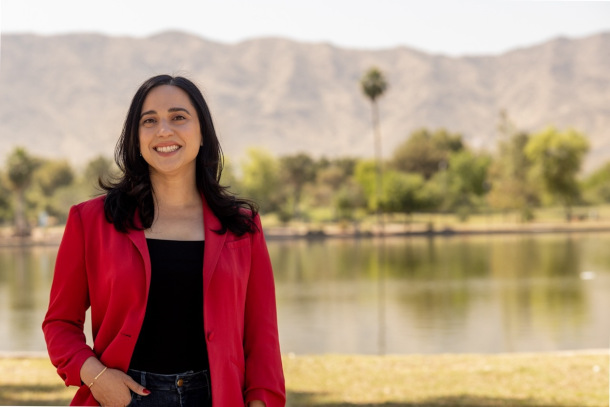
Yassamin Ansari has been elected to Congress as a Democrat to represent Arizonia’s 3rd Congressional District. (Photo: Courtesy of Yassamin for Congress)
CURWOOD: From PRX and the Jennifer and Ted Stanley Studios at the University of Massachusetts, Boston, this is Living on Earth. I’m Steve Curwood. Many in the US Congress have supported climate action, but few have worked as directly in international climate negotiations or on hands on protection from climate risks as freshman Democrat Yassamin Ansari. As a college student, she went to Congress as an intern for Speaker of the House Nancy Pelosi, and climate became her focus during a fellowship with UN General Secretary Ban Ki-Moon as he worked on the Paris Climate Accord. In 2021, Yassamin Ansari became the youngest woman elected to the Phoenix City Council, where she promptly created an office of heat response and mitigation, and in November, she won Arizona's Third Congressional District. Before she was sworn in, we called her up. Hi, Congresswoman-elect. Welcome to Living on Earth.
ANSARI: Thank you for having me. I really appreciate it.
CURWOOD: Working on the Phoenix city council, I understand that you were quite concerned with people dealing with the heat. There were over 50 days last year in Phoenix when temperatures hit over 110 degrees. And what, how many people died, some 600? How did you approach this issue as a city council woman?
ANSARI: So Phoenix has been on the front lines of climate change for quite some time, and in particular that manifests as extreme heat. I came into the city council with a background in climate policy. I had worked at the United Nations and coming on to the Phoenix city council, it was really important to me to make these issues the forefront of my work, because of what a significant issue it is for our daily lives here. So as you rightly pointed out, we face significant extreme heat, especially over the summer months. This year, we had triple digit days well into October. And how we have to prepare as a city, to respond and to adapt and to make sure we're resilient to these climate impacts comes in the form of heat mitigation, making sure that we are adequately prepared for those most severely hot days, and as we've seen a rise in homelessness in our community, we've also seen rising deaths because of extreme heat. So myself and the council and the mayor worked together to establish the country's first publicly funded office of heat response and mitigation. This is a dedicated team who is responsible for making sure that we have a proactive heat relief plan every year and that that is improved upon. So we've opened cooling centers over the summer months. We've done more and more outreach every year. So I personally have gone down to some of the encampments. We let people know about the amenities that are available because we want to try to save as many lives as possible. We have a long way to go. In Congress, one area that I hope to work on is pushing FEMA to declare extreme heat as a natural disaster, to help unlock federal funds to help us address this. It's challenging because extreme heat, it's a silent killer. You know, it doesn't have the same imagery that you see with hurricane or other forms of natural disasters, but very real, very much a natural disaster, not going anywhere. And we need to make sure that cities like Phoenix have resources to save lives.
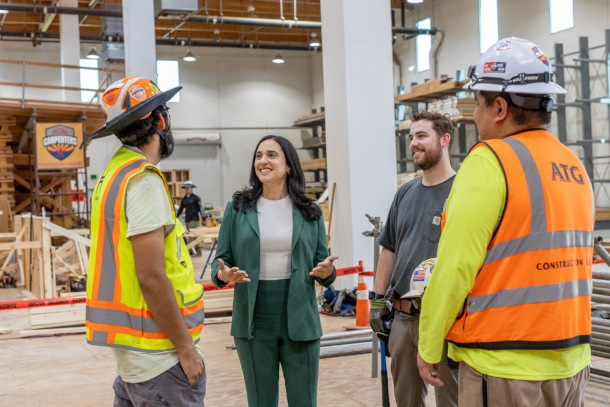
Ansari believes that Republican representatives could support green energy initiatives if they bring jobs to their districts. Here is Yassamin on the campaign trail, visiting the local carpenters union. (Photo: Courtesy of Yassamin for Congress)
CURWOOD: As I understand it, back in 2014, you got involved with the UN as it was preparing to move forward with what would become the Paris climate agreement through the UNFCCC. What was it like working as an advisor to at that time, it was the UN General Secretary was Ban Ki-Moon. He was very much involved in these negotiations. What was that like?
ANSARI: It was one of the most formative experiences of my life. I definitely would not be sitting where I am today as a congresswoman elect if it wasn't for the work I had done on climate change. When I joined the team, I think the most important thing I learned was the importance of engaging with diverse viewpoints. There's a reason it took decades to make the Paris Climate Accord a reality, and that's because every single country in the world is dealing with their own unique set of circumstances and challenges. In the United States and in developed countries, we have already benefited from the fossil fuel industry in terms of where we are today as an economy. However, a developing country, let's say India or other Southeast Asian countries, they are still developing. They still have many residents without power, and so for them, it's very different. It's a very different conversation. So it's difficult to have a conversation about transitioning when they still rely so heavily and need fossil fuels. And so what I learned is these difficult conversations are incredibly important. We're not going to get anywhere without continuing to have these difficult conversations and without a country like the United States really playing a leadership role in moving forward, with being a leader on clean energy, with providing climate finance support to developing countries. I just can't implore enough how important it is for the United States to not shy away from being a leader on this issue.
CURWOOD: So when Donald Trump came into office, he said, hey, we're getting out of the Paris Climate Agreement. Joe Biden comes into office and says, we're back in. As we're speaking today, we're hearing that President-elect Donald Trump is probably going to take us back out of Paris. How do you respond to that?
ANSARI: It's horrible. I don't want to understate how devastating that is to so many around the world. When he first pulled out, that's one of the reasons I was encouraged to ever think about running for public office, because I knew that local action would be more important than ever. We lose so much trust internationally when we make a commitment as a nation, only to revert back just a couple of years later. What we saw last time, I will say, is a lot of coalition building among cities, states, companies. There was a whole movement called the We Are Still In movement coalition that they said, look, even if the federal government is not sticking to its promises, we are going to stick to the promises and make sure that the United States abides by the commitments that it makes. I'm sure, and I hope we see the same this time from nonfederal actors. But I'm extremely disappointed, and I think it's a grave mistake.
CURWOOD: The CEO of Exxon is imploring President-elect Trump not to pull out of Paris. From your perspective, what kind of arguments among the Republicans might possibly persuade President-elect Trump to stay with the UNFCCC Paris Agreement?
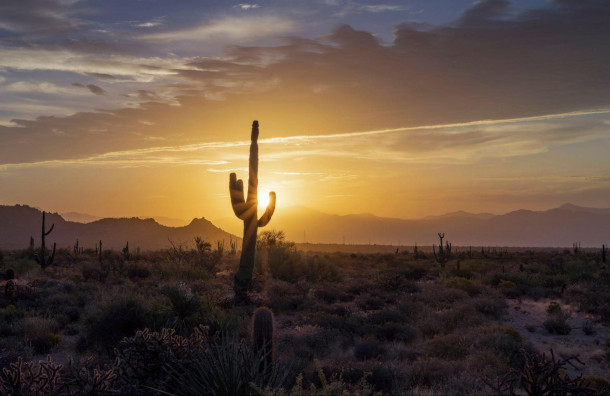
Maricopa County statistics point to 466 preliminary confirmed deaths of residents related to extreme heat in 2024. Many of these deaths are seen in vulnerable populations, such as unhoused residents. (Photo: Ray Redstone, Wikimedia Commons, CC BY-SA 4.0)
ANSARI: Two arguments that I think are compelling and should be compelling to all Americans: One is the economic case, and two is the national security case. I think that economically, the transition for the United States to clean energy is a positive one. The job creation that we are seeing as a result of the infrastructure bill and the Inflation Reduction Act are significant. I mean representing Phoenix, Arizona, I can tell you that the number one beneficiaries of all of this job creation are working people in Arizona, labor unions, representing carpenters, the iron workers, the building trades. We're seeing such a boom in these industries here locally, thanks to these investments that were made, and this is all part of the Paris Agreement. The commitments that we've made as part of the Paris agreement have manifested through the infrastructure bill and otherwise. Secondly, I think there's a very strong national security case to remain in the Paris Accords as well. There is strong interconnection between the threat of climate change and security. You know, it was the United States Navy and the military decades ago, in the 70s, who first warned about the impacts that they are seeing as a result of sea level rise on their operation. So if we want to remain a formidable military, then it's important for us to take climate change seriously.
CURWOOD: What's your agenda and what is it that you think you can get done representing the third district in Arizona in terms of moving the ball forward on the question of climate?
ANSARI: My hope is to really continue to work on everything that I worked on at the Phoenix city council. I had a strong focus on transportation and infrastructure. I helped pass the city's transportation electrification plan, which was actually passed on a bipartisan basis. Democrats voted for it, but also my Republican colleagues voted to have a fleet transition plan so that by 2040 we can transition our busses in the city to clean electric busses, to enhance our public transportation, to build EV chargers. So I think that this issue can be bipartisan. We're going through the process right now of applying and lobbying for committee assignments, and I hope to serve on the Transportation and Infrastructure Committee, and my agenda will be the same. It'll be to continue to lead the charge to make Arizona the clean energy capital of the country, and also make sure we are creating new jobs in the clean energy industry, that we're protecting labor standards in the process. Something that I'm very interested in as well, and I think is going to be very important, is just transition and ensuring that workers who were employed either in coal plants or in the fossil fuel industry are reskilled and able to find opportunities in the clean energy economy. That is something I'm deeply concerned with. I want to make sure we're leaving nobody behind in this transition. And and I think there's room there to work with both Democrats and Republicans, because why would we not want to create good, high wage jobs for our districts, for our communities, and get the benefits along the way, like clean air, clean water and just improve public health for all?
CURWOOD: What gives you hope in terms of dealing with what really has become the climate crisis, as a member of the US Congress?
ANSARI: My classmen definitely give me hope. It's a really smart, passionate, committed group of people. I'm also really hopeful that when it comes to climate and clean energy, there are growing number of champions at all levels of government, but also in the private sector, who understand the urgency and are taking action to address it. Going back to the first Trump administration, the positive thing that came out of that was the immense amount of work on climate policy from companies in the United States. From now you see cities around the country having robust climate plans that are very much underway, and I have no doubt that that will continue, and the work will go on, despite the policies that may or may not come from the new administration. I know that the good work will go on.
CURWOOD: Yassamin Ansari is the incoming Congresswoman for Arizona's Third Congressional District. Thanks so much for taking the time with us today.
ANSARI: Thank you so much. Have a great day.
Related links:
- Learn more about Yassamin Ansari.
- Prepare for extreme heat.
- Understand the Paris Climate Accord.
[MUSIC: Fourplay, “Argentina,” on Energy, Heads Up 2008]
CURWOOD: Coming up, the African American enclave of Shiloh Alabama seeks justice after getting flooded out by highway construction. Stay tuned!
ANNOUNCER: Support for Living on Earth comes from Sailors for the Sea and Oceana. Helping boaters race clean, sail green and protect the seas they love. More information @sailorsforthesea.org.
[CUTAWAY MUSIC: Fourplay, “Argentina,” on Energy, Heads Up 2008]
Montana Climate Win

Youth plaintiffs Badge Busse, Mica Kantor, and Eva L. are cheered on by supporters as they arrive for their second day of trial in June 2023. The district court ruling from Judge Kathy Seeley in August 2023 was upheld by Montana’s State Supreme Court in December 2024. (Photo: Robin Loznak/Courtesy of Our Children’s Trust)
CURWOOD: It’s Living on Earth, I’m Steve Curwood. By a 6 to 1 majority the Montana State Supreme Court has upheld a ruling that found young people—and by extension all people in Montana—have a constitutional right to a livable climate that state officials can’t ignore. To help us put this decision in context we turn now to former EPA regional counsel and Vermont Law and Graduate School emeritus professor Pat Parenteau. Hi, Pat, welcome back to Living on Earth!
PARENTEAU: Thanks, Steve. Pleasure to be with you.
CURWOOD: Hey, Pat, how big a deal is this Montana State Supreme Court decision saying, in essence, that young people have the right to not have the state be promoting climate disruption?
PARENTEAU: Right, so this is the first court in the United States to recognize a constitutional right to a stable climate, that's the language that the court used, and that the state cannot turn a blind eye to this and when it's making decisions that's making this crisis worse by continuing to pump more and more fossil fuel, not only into the energy system, but into the atmosphere. That's a violation of these constitutional rights, and it's a landmark decision, because we've seen what's happened in the federal courts in the Juliana case, those attempts to seek a constitutional right to a climate system capable of supporting human life, is the way it was framed in that case, that's gone nowhere. Those cases have all been thrown out. In fact, Our Children's Trust, which brought the case in Montana, has lost many of the other cases that they've brought seeking constitutional rights. So this was a real breakthrough, and it needs to be recognized as historic in that sense. In other parts of the world, we've seen courts recognize constitutional rights, human rights, and a variety of bases to attack the climate problem, but in the United States, we've gotten nowhere. So this was a big, big breakthrough.
CURWOOD: Remind our listeners, what's the premise of this youth lawsuit?
PARENTEAU: So this case was originally brought to challenge Montana's energy policy, which, of course, is heavily fossil fuel dependent, because, among other things, Montana has the largest reserves of coal in the United States, plus a lot of oil and gas. So the original case was to try to force the state to change its energy policy and transition to renewables. Then the case sort of morphed and changed into simply a request for a declaratory judgment that a particular statute that the Montana legislature had adopted was unconstitutional because it violates Montana's right to a clean and healthy environment. So the way the case finally was framed, it was a question of whether or not this individual statute was unlawful and in violation of the Montana constitution.
CURWOOD: And I take it that the plaintiffs were saying that that right to a clean environment, of course, includes a right to not be roasted by climate change.
PARENTEAU: Yes, exactly. And that was not a foregone conclusion. I mean the language of the provision, “clean and healthy environment” doesn't, of course, mention climate, nor did the legislative history of the 1972 constitutional amendment talk about climate. So it was not a foregone conclusion that the courts would ultimately read the Montana constitution to include the right to a stable climate. That became the central focus of the case.
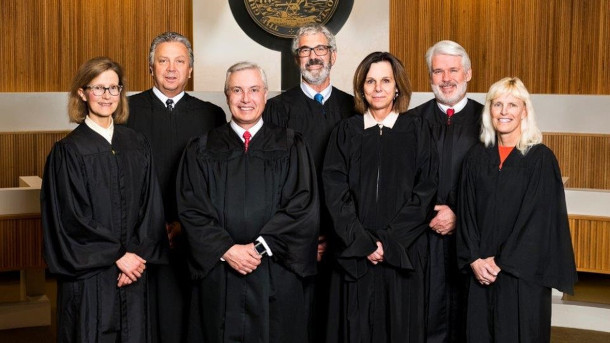
Montana’s State Supreme Court. From left to right: Justice Beth Baker, Justice Dirk Sandefur, Justice James A. Rice, Chief Justice Mike McGrath, Justice Laurie McKinnon, Justice James Jeremiah Shea, Justice Ingrid Gustafson. (Photo: State of Montana)
CURWOOD: And I guess they're helped by the Federal ruling that carbon dioxide is a pollutant, so therefore it's not clean. It's polluting the atmosphere.
PARENTEAU: Yes, and in the trial of this case before the district court, there was extensive evidence, which, by the way, the state did not attempt even to rebut, that climate change, global warming, was damaging air, water, land, wildlife, wilderness, basically challenging the whole physical character of the state of Montana. Plus impacting public health, including the health and the mental health of the young plaintiffs that were bringing the case. So the record in this case is one of the most extensive that I've seen on documenting all the ways in which the warming that has already occurred is causing serious daily damage to the resources of Montana and other states.
CURWOOD: Pat, let's get just a little bit of the status of this case. What has the Supreme Court of Montana done now?
PARENTEAU: So the Supreme Court heard arguments last summer. There are seven members of the court. They are elected. They're not appointed, as in other states, and, of course, our own US Supreme Court, as we know, so, the Montana Supreme Court has a majority of democratic justices, and they have to stand for reelection periodically. So that's one of the distinctive factors about this case is this is probably one of the most liberal state supreme courts in the country. So when the Supreme Court heard argument, the argument of the state was, look, everybody in Montana is affected in every bit the same way as these young plaintiffs. There's no distinction here. So the Supreme Court took that head on and said, look, the fact that everybody is affected by this crisis shouldn't mean that nobody has standing to challenge what's going on here in terms of this prohibition on considering climate change impacts when you license and permit oil and gas development, right? So that was a big decision. And in fact, the extent to which the court lays out a blueprint for how you think about young people bringing these cases, not just in Montana, but anywhere, I think it's a blueprint for other state courts to follow, and I think there probably will be other state courts dealing with these issues. So that was a big concern. And then the question was, if all you're asking for is a declaratory judgment, how does that change anything? How does that give you any relief or any remedy? And the answer to that, the Supreme Court said, is, look this right in the Montana Constitution has been interpreted by previous Montana Supreme Court decisions as being a fundamental right, not just a incidental right, but one that requires what's called strict scrutiny when a legislative act like this statute encroaches upon that right. So this is the highest level of protection a Constitution can provide. And so the court said, the fact that you're violating that fundamental right, that's enough to justify a declaration that it's unconstitutional and the state can't persist in closing its eyes to the impacts of what it's doing. So very, very significant, I would say precedent that's fleshed out, it's about, I think, a 70 page decision. It's an extensive discussion, and other courts are going to look at it.
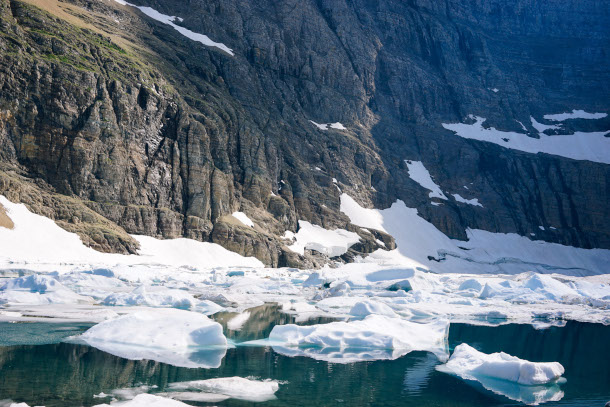
Plaintiffs argued that the state’s constitution details their right to a clean and livable environment. Montana is a state known for its natural beauty, with sites like Glacier National Park renowned nationally. (Photo: Sinziana Gafitanu, Flickr, CC BY-SA 2.0)
CURWOOD: So this is the state Supreme Court on a state case. To what extent can the people unhappy with this decision, I think the Republican dominated governor and such, to what extent might they be able to go to the federal system, to the United States Supreme Court, to get this thing flipped?
PARENTEAU: They may try. I mean, it's true that Governor Gianforte has told President-elect Trump that you can count on Montana to back up your energy dominance agenda, and it is drill, baby, drill. So we know that the leadership in Montana is probably not going to change its ways in response to this decision, but it will be very difficult to get the US Supreme Court to weigh in on this case. There's no federal nexus here at all. This is all about state law, state constitutional law. It's a limited remedy. It's only telling the state what it can't do, which, again, as I said, close its eyes to the consequences of what it's doing in permitting all of this fossil fuel development. That's all that the Court has said. It hasn't said you have to change your energy policy. It hasn't affected any other state. It doesn't trip any of the wires that would normally lead to the United States Supreme Court feeling like it has to step in. I think if you were to ask this Supreme Court the question, do you think there's a constitutional right or should be, I think I know what the answer would be. I just don't think that question is going to get to the court in this case. If you start to see other state courts follow this decision, so that you start to see more widespread impacts on energy systems, including fossil fuel based systems, you might maybe in the future, see that the Supreme Court gets interested, but as of right now, I think they stay out of this.
CURWOOD: Pat, what other states, what other jurisdictions have the kind of constitutional protections for the environment in their state constitutions, so that perhaps actions might be brought in those states?
PARENTEAU: Yeah. So there are at least eight states that have this, what's called a green amendment to their constitution, a right to a healthy environment. You know, some surprising states, Alaska, Louisiana, Florida, and then some not so surprising, New York and Pennsylvania. So I would expect to see cases being brought in those states selectively. That's the whole game here is you've got to really have a strong factual case with strong plaintiffs that can demonstrate standing under different states. So all of this is quite complicated, but I do expect to see other cases being brought. There's one pending in New Mexico now that doesn't deal directly with climate, but New Mexico has an interesting provision that requires the state to limit pollution from oil and gas extraction. And so there's a case moving its way up through the New Mexico courts. It's the Atencio case. That bears watching, because that's headed for the New Mexico Supreme Court, which is another pretty progressive Supreme Court. I can see a pattern developing of trying to find constitutional bases for climate cases grounded in state constitutional law. Forget federal constitutional law, for now, but looking at state constitutions coming up with creative, well thought-out, well-grounded lawsuits. We could see a trend develop. I'm not necessarily predicting that, but we could see that, and it would be a good thing to see.
CURWOOD: Pat, before you go, how important are the states in this? You know, famously the state constitution of Massachusetts, which was drafted back in the late 1700s calling for equal rights eventually led to a ruling in favor of gay marriage.

Pat Parenteau is emeritus professor of law at Vermont Law School and formerly served as EPA Regional Counsel. (Photo: Courtesy of Vermont Law and Graduate School)
PARENTEAU: Yeah, I do have greater confidence that the states are not only the laboratory for the development of environmental law, constitutional law, human rights law, but also the forums that the states provide are so different, and the opportunities to bring cases in courts that are inclined to read into constitutions, rights that aren't explicitly enumerated, but rights that any sort of rational person would recognize as fundamental. And what could be more fundamental than having a climate system, as Judge Aiken in Oregon famously said, capable of supporting human life on Earth? I mean, how can you argue that that should not be a fundamental right recognized and enforced through constitutional based lawsuits? So I do have hope. I'm not naive enough to think we're going to see 50 states doing this. But as these conditions get worse and worse, climate is forcing the courts at every level, but now we're talking state courts, forcing courts to acknowledge that more needs to be done, that there are real victims of the failure of government to deal with these problems. So that is where the battleground is. I think it's in the states, and we'll see what happens.
CURWOOD: Pat Parenteau is a former EPA Regional Council and emeritus professor at Vermont Law and Graduate school. Pat, thanks for taking the time with us, and we'll keep up with you throughout the New Year.
PARENTEAU: Thanks, Steve.
Related link:
Daily Montanan | “Montana Supreme Court Affirms Decision in Held, Historic Youth Climate Case”
[MUSIC: Devon Leger, “White Buffalo,” traditional Métis fiddle tune, YouTube performance from 2024: https://www.youtube.com/watch?v=gST_pBlvGus]
Last Call to Biden for Environmental Justice
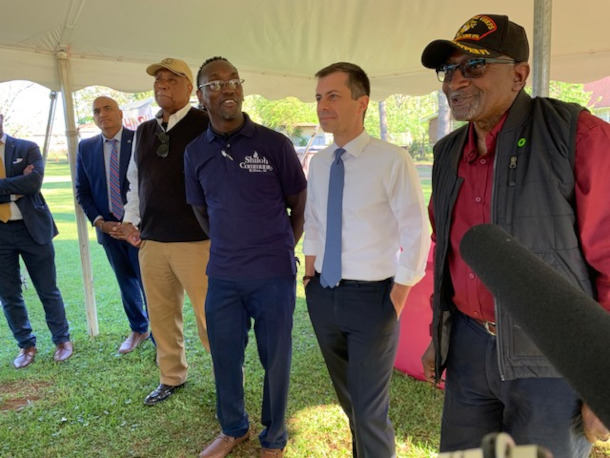
Former FHWA administrator Shailen Bhatt (left), Coffee County Commissioner Jimmy Jones (center left), Pastor Timothy Williams (center), Transportation Secretary Pete Buttigieg (center right), and Robert Bullard (right). This photo was taken when Secretary Buttigieg visited Shiloh, Alabama to survey flooding damage caused by the widening of Highway 84. (Photo: Andrew Skerritt)
CURWOOD: As the end of President Biden’s term approaches on January 20th, the African American residents of a southeast Alabama hamlet called Shiloh say they are still waiting for the full measure of environmental justice promised by the Biden Administration. Back in 2018 the State of Alabama widened and raised nearby Highway 84, sending major cascades of water into Shiloh where it flooded foundations and overwhelmed septic systems. When the state was slow to respond, residents ultimately took their case to the US Department of Transportation. Their concerns went unanswered until April of 2024 when Secretary of Transportation Pete Buttigieg decided to visit Shiloh to see for himself.
BUTTIGIEG: I don't claim to have a magic wand on me, but I got a lot of tools, and we have a lot of tools in this administration, which we are determined to put to work to benefit this community. President Biden made very clear from day one of his administration that he expects all of the tools of our administration to serve everybody, include people, including people who've been left out and excluded in the past. That's part of what our travels recently have been about, using federal dollars to address places where sometimes in the past, federal dollars were part of the problem, and we are not going to let that happen again.
CURWOOD: After the Buttigieg visit, the State of Alabama agreed to fix the highway drainage and stop the flooding, but the Shiloh residents were left on their own to pay for the damage to their homes. They remain outraged, and environmental justice expert and Texas Southern University Professor Robert Bullard, grew up near Shiloh. He serves on Biden’s White House Advisory Council on Environmental Justice and recently wrote an open letter to Secretary Buttigieg. It implores him to use his last days in office to provide a just resolution. Professor Bullard joins me – welcome back to Living on Earth!
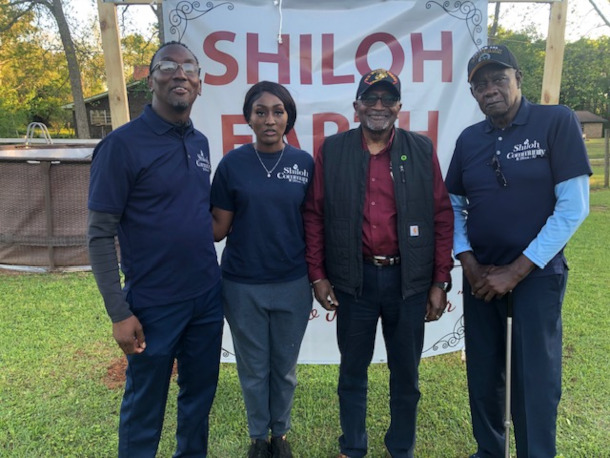
Pastor Timothy Williams, Melissa Williams, Robert Bullard and resident Willie Horstead, whose mobile home footings were damaged by the flooding. (Photo: Andrew Skerritt)
BULLARD: Glad to be here.
CURWOOD: So what prompted you to go public with your letter?
BULLARD: Time was running out. The highway was built under the first Trump administration in 2018. The community had flooded for two years under the Trump administration. It actually had flooded almost four years under the Biden administration. It was an emergency that something be done and resolution be had and not bleed into another administration.
CURWOOD: What exactly do you say in your letter?
BULLARD: Hard working residents of Shiloh, Alabama, which is Elba where I grew up, have worked hard for their homes and should not have land that, in many cases, go back to land that was first owned by their ancestors,land dating back, like my family, to the 1870s Reconstruction. So you have homeowners and landowners that survived slavery, survived Jim Crow segregation, but somehow is having a problem of coming through this flooding caused by tax dollars by highway. And that's as simple as I can put it.
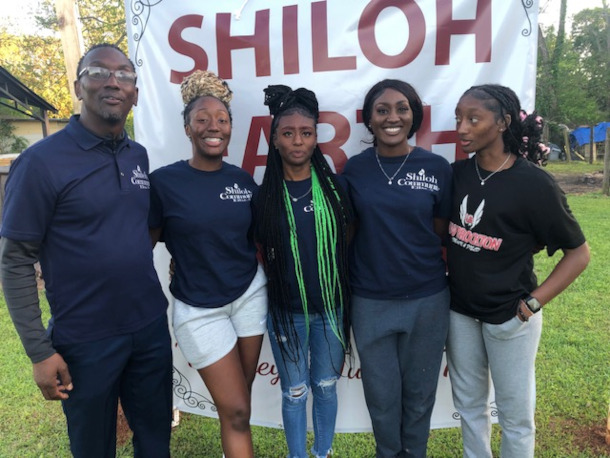
Pastor Timothy Williams and his daughters Nina Williams, Casey Williams, Melissa Williams and Brittany Williams. (Photo: Andrew Skerritt)
CURWOOD: Now there was a voluntary resolution agreement between the Federal Highway Administration, which of course, is supervised by Secretary of Transportation, Pete Buttigieg, and the Alabama Department of Transportation that addressed the complaints of the residents. Why do Shiloh residents see this voluntary resolution agreement as only a partial victory here?
BULLARD: The Title Six civil rights complaint that was filed by the residents two years ago was settled and and the US DOT is requiring the state to fix this flawed highway, but it stopped short of requiring fixing the damage to people's homes, to their sewer, septic systems that's overflowing, the ruin, to the driveways that's cracking, to the fact that some of the homeowners are losing their homeowner's insurance. So there's a complete devastation that this flooding has caused. And just to fix the highway is not enough. It's not a total victory.
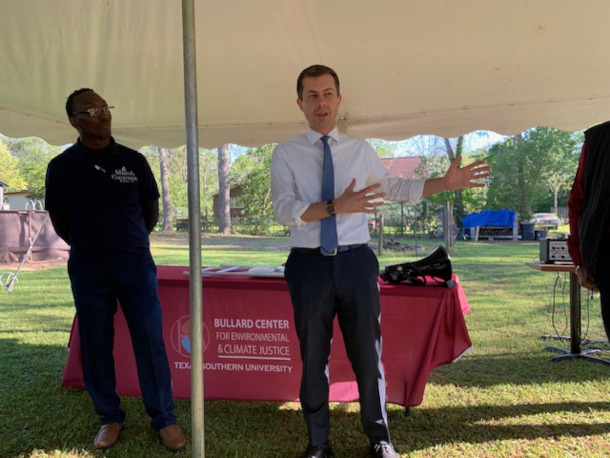
Transportation Secretary Pete Buttigieg (right) speaks to the gathering after he toured the neighborhood for several hours as Pastor Timothy Williams (left) looks on. (Photo: Andrew Skerritt)
CURWOOD: Talk to me about your level of disappointment with the action by Pete Buttigieg and the US government here.
BULLARD: The residents and the Bullard Center were able to get Secretary Pete Buttigieg to come to Shiloh. He came there in April. He walked the grounds. He saw the damage, he saw the highway, how incredibly weird and crazy engineering was that had gone into building the highway, and he promised the community, and so he promised this community to be made whole. He said that the flooding and the damage was not the residents' fault, and that he would look to the federal government using Inflation Reduction Act and the bipartisan infrastructure dollars we’re talking about, billions of dollars that's available for the fixing highways that have destroyed communities, in some cases, decades ago. And so the community had high hopes, and I had high hopes that something would be done. This was back in April. The community is saying, it would be a total disgrace for the Secretary of Transportation to leave office and not fix this highway and fix the damage that's been caused by this community.
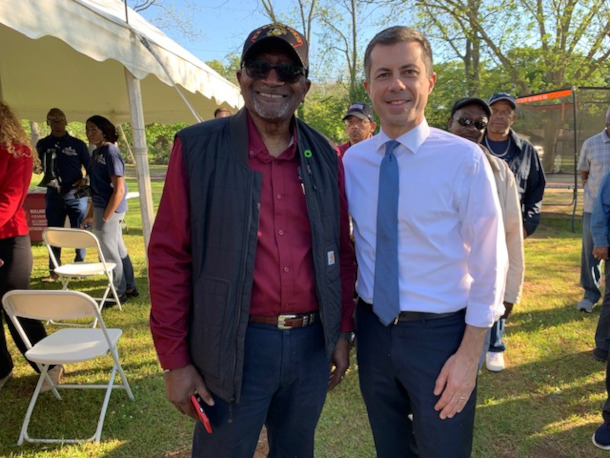
Robert Bullard (left) and Pete Buttigieg (right). (Photo: Andrew Skerritt)
CURWOOD: So what would a just resolution look like?
BULLARD: The residents are saying that they want their homes and their property made whole for all the damage that's been caused, whether it's, in some cases, there are some homes that are beyond repair, and there are some residents who want to be relocated because they have no trust in Alabama Department of Transportation to really fix that highway. It's been patched up over the years, and there's no guarantee that it will be remedied in a way that it will never flood again.
CURWOOD: Now, to what extent can the Biden administration say, well, we just can't push the money out the door. You would say…
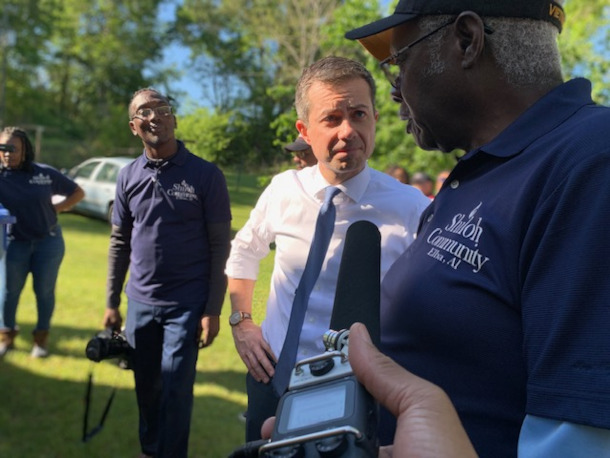
Pete Buttigieg (center) speaks to Willie Horstead (right). (Photo: Andrew Skerritt)
BULLARD: They had four years and they're coming down to the wire, and we say, go across the finish line with a victory. We would say, go and do what you can do with the days that you have left, and make sure that justice right now is not delayed.
CURWOOD: What do you think is the lesson for Shiloh and other environmental justice communities coming out of this struggle?
BULLARD: Well, I think the lessons learned is that you can never stop fighting, and when you have worked hard, paid your taxes, and then you have tax dollars being used to destroy the homes that you have built and the taxes that you have paid have been used against you, it means that we have to understand that anytime hardworking people are successful in achieving the American dream of home ownership, of getting property, owning businesses, that it's not safe, and it's never something that you can stand by and see this injustice unfolding in front of your eyes. I wrote a book 20 years ago, 2004 called, "Highway Robbery: Transportation Racism & New Routes To Equity." If I had to put a a picture on the cover of that book today, I would put Shiloh, the poster child for transportation racism.
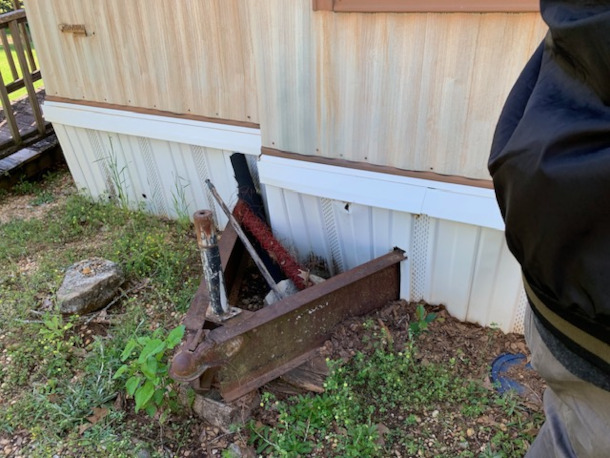
Willie Horstead’s damaged mobile home. (Photo: Andrew Skerritt)
CURWOOD: Robert Bullard is a professor at Texas Southern University and an icon in the study of environmental justice for the last 40 years. Dr. Bullard, thank you so much for taking the time with us today.
BULLARD: Thanks for having me.
CURWOOD: So far there has not been a definitive response from Alabama or the US Department of Transportation about compensating the residents, but the community of Shiloh says it will not give up its fight until justice is done. Statements from the Biden Administration and the State of Alabama are on the Living on Earth website, loe.org.
Editor's note: An Alabama DOT spokesperson said they "have been engaged with the Federal Highway Administration for quite a while as they work the process of the voluntary resolution agreement" and that they "anticipate having more to say on the matter in the coming days."
The full statement from Secretary Pete Buttigieg can be found in the links below.
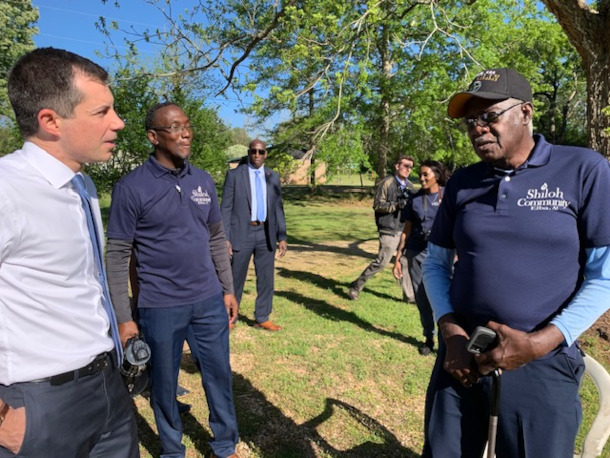
Buttigieg (left) listens to Pastor Williams (center) and Horstead (right) describe the impact of the flooding damage caused. (Photo: Andrew Skerritt)
Related links:
- Read Robert Bullard’s Open Letter
- To read the Voluntary Resolution Agreement, visit the FHWA Office of Civil Rights webpage
- Inside Climate News | “How Racism Flooded Alabama’s Historically Black Shiloh Community”
- Secretary Buttigieg Statement on Shiloh residents’ request for full compensation
[MUSIC: Jay Ungar and Molly Mason Family Band, “Ashokan Farewell,” comp. Jay Ungar, recorded at Folk Alley studio 2011, available on YouTube https://www.youtube.com/watch?v=2kZASM8OX7s]
CURWOOD: Just ahead – We say goodbye and thank you to a great pioneering scientist and activist, George Woodwell.
ANNOUNCER: Support for Living on Earth comes from Friends of Smeagull the Seagull and Smeagull’s Guide to Wildlife. It’s all about the wildlife right next door to you! That’s Smeagull, S - M - E - A - G - U - L - L, SmeagullGuide.org.
[CUTAWAY MUSIC: Jay Ungar and Molly Mason Family Band, “Ashokan Farewell,” comp. Jay Ungar, recorded at Folk Alley studio 2011, available on YouTube https://www.youtube.com/watch?v=2kZASM8OX7s]
George Woodwell Tribute

Dr. George Woodwell fought to integrate scientific knowledge into public policy for over sixty years and served as a climate advisor in the Carter White House. He also played an influential role in drafting the UN Convention Framework on Climate Change Kyoto Protocol, and helped found the Environmental Defense Fund, and the Natural Resources Defense Fund. George Woodwell also founded the Woods Hole Research Center, renamed upon his retirement as the Woodwell Climate Research Center. He passed away in June 2024 at the age of 95. (Photo: Daniel Webb)
CURWOOD: It’s Living on Earth. I’m Steve Curwood. Few scientists have had as stellar a record in environmental science or policy activism as George Woodwell, who died in June of 2024 at the age of 95. His life’s endeavor was to understand the systems on planet Earth that support life and act to protect them. He is perhaps most famous for his climate work, but when George Woodwell won the $200,000 Volvo Environmental prize in 2001, the citation mentioned that in the1960’s he was among the first to investigate the health effects of radioactivity. That was followed by groundbreaking research that ultimately supported America's ban on DDT. This unassuming biologist was part of a team who documented climate change for President Jimmy Carter in the 1970’s. And George Woodwell was keen to bring science into public policy and action. He helped found the Environmental Defense Fund, the Natural Resources Defense Council, and the World Resources Institute. He also founded the Woods Hole Research Center which is now known as the Woodwell Climate Research Center. Under his leadership, that Center began its program of documenting how forests affect global climate and delivered seminal work that led to the UN Framework Convention on Climate Change. And on a personal note, back in 1989, he encouraged me to start the Living on Earth broadcasts. In the summer of 2016, I sat down with George Woodwell shortly after he published his sixth book, A World To Live In. He told me that title reflects what he sees as the challenge for our times.
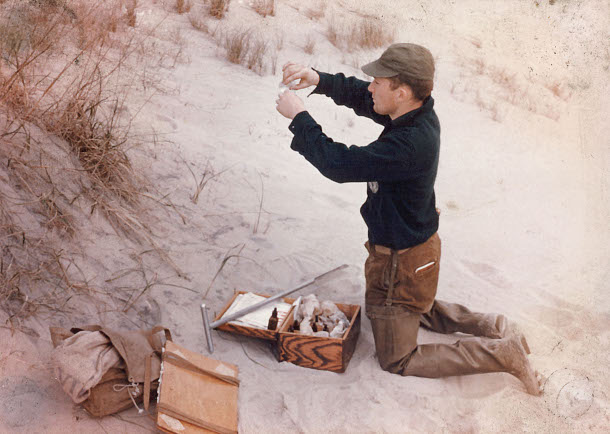
George performs graduate research in North Carolina, circa 1950s. He received a masters and PhD degree in botany from Duke University, completing his studies in 1958. He received his bachelor’s degree in biology from Dartmouth College in 1950. (Photo: Courtesy of Woodwell Climate Research Center)
WOODWELL: Well, the world is literally falling apart. We have reached a point where the opportunities for experimentation with politics and with economics, the two big systems that we admire and use and have developed to a high degree are limited -- they are limited by the biophysical limits of the earth and that topic -- the biophysics of the earth, is a topic that I have pursued for my whole career and it’s perfectly conspicuous where those limits are becoming important. DDT is a persistent pesticide. It was hailed as the ultimate pesticide in the postwar years when it was first released for general use. We showed in Long Island that the food web there was contaminated from the water of the marshes right on through the life of the marshes, clams, birds, and every trophic level existing at that time in the middle 1960s, had a burden of DDT residues coming from the aerial spraying of salt marshes to control the salt marsh mosquitoes within a factor of 10 of the acute lethal level for that organism. That sounds as though it's safe enough but the concentration up that food web was enormous. The concentration factors ran up to a hundred thousand fold. As a result of that we did get a court order which in the end resulted in the abandonment of DDT for use in spraying the salt marshes, and ultimately it led to the development of Environmental Defense Fund and the abandonment of DDT for general use in United States which was a wise thing.
CURWOOD: Your book paints corporations and industry interests as bearing the brunt of blame for environmental havoc through the decades. What kinds of events have shaped this perspective?
WOODWELL: Well, industries feel as though, in fact say commonly, that their purpose is financial profit at whatever cost. and they've made the assumption that cost can legitimately be pushed into the public realm. I look at this these days in a world of 7 billion people, pushing all the biophysical limits of the earth, and say, “Well, let's look at industries and ask just what their purpose is.” There is no industry that doesn't claim that it's doing something that's useful to the public in general, that they are selling a useful good of some sort, and in the process they're making a profit, but the profits get put first. Fiduciary responsibilities get talked about as being preeminent. Well, that’s ridiculous. It's absolutely not possible to have a tight world of seven billion or more people who are growing into demands, further demands, on resources all the time by developing technologies that make it possible to exploit bigger pieces of the resources available, all of those competing with one another, and turn these industries loose to do that.
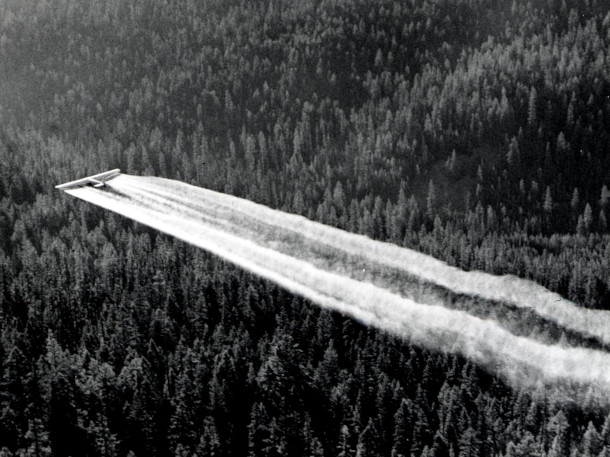
Ford tri-motor sprays DDT pesticide in July 1955. Dr. Woodwell was among the first scientists to warn of the harmful effects of DDT on wildlife. (Photo: USDA Forest Service, Pacific Northwest Region, State and Private Forestry, Forest Health Protection, Wikimedia Commons)
CURWOOD: So, you discuss in your book what the various presidencies throughout the years have meant for the climate. So which presidents have been the best in your view? Which have been the worst when it comes to climate change policy?
WOODWELL: Oh, my. Well, (CHUCKLES) Clinton had the greatest opportunities. Actually, Carter was the very best. He understood the problem. He did things about it. He put solar panels on the roof of White House, and he developed the Solar Energy Research Institute, and he was very astute and intellectually engaged. And if he had continued, if he had not been displaced by a conservative president, Mr. Reagan, who abhored anything to do with science and with the climatic disruption, we would have been 30 years ahead of where we are now.
CURWOOD: And in your view, the worst president in terms of climate? Perhaps you’re suggesting President Reagan, then.
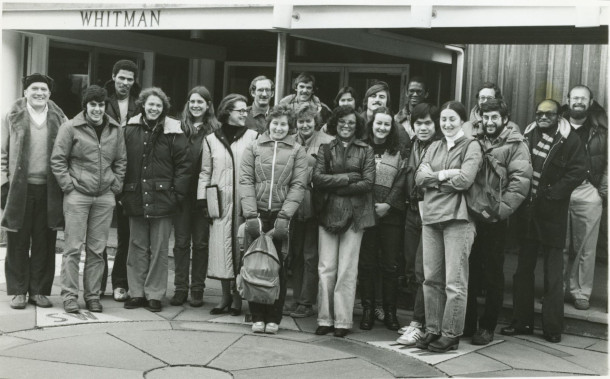
Dr. Woodwell started the Ecosystems Center in 1975 at the Woods Hole Marine Biological Laboratory. George (far left) stands with students from the January course on ecology at the Center, circa 1979-1982. (Photo: Courtesy of Woodwell Climate Research Center)
WOODWELL: (CHUCKLES) Well, the transition that Reagan made, of course, was important, but the presidents who followed him had to go out of their way to do anything really constructive. And, when Al Gore was asked to take a vigorous stand on the climate issue while he was in office, he said, “Hmmm, you want me to commit political suicide?” Things had degenerated to that point.
CURWOOODL: As part of our lookback at the extraordinary career of the late ecological scientist and activist George Woodwell, we are replaying an interview with him recorded back in the summer of 2016 when he released his book, A World to Live in. It was the middle of the presidential campaign, so I turned the discussion to the major party candidates.
CURWOOD: So, let's talk about today. What do you think a Trump presidency would mean for the climate?
WOODWELL: That's a fairly simple question. I don't think Mr. Trump has the slightest idea as to how environment limits economic and political aspirations or human aspirations, and I just don't really care to speculate as to just how bad he would be.
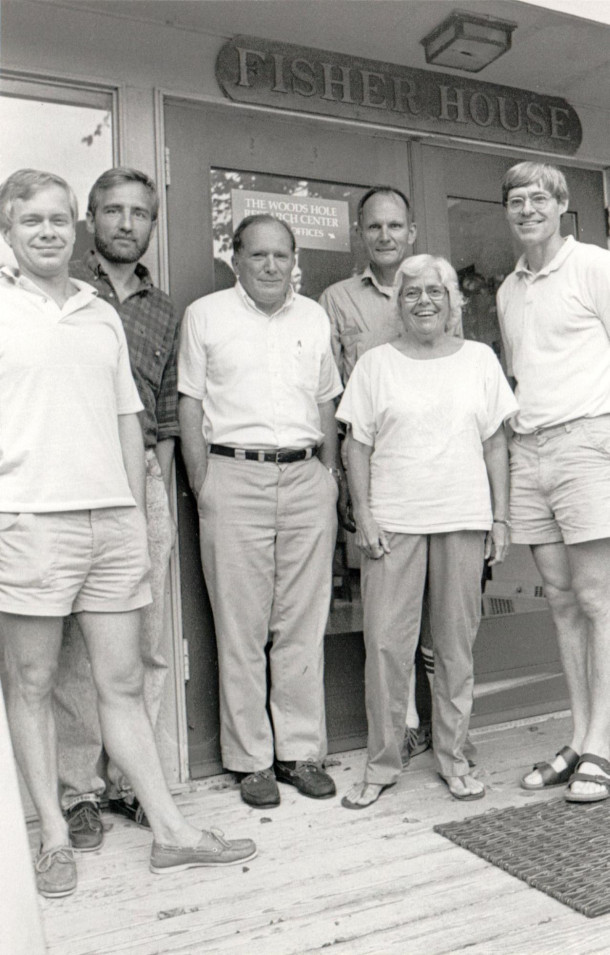
(Left to right) Tom Stone, Foster Brown, George Woodwell, Walter Matherly, Katharine Woodwell, Skee (Richard) Houghton at the Woods Hole Research Center (now the Woodwell Climate Research Center) in the late 1980s. Dr. Woodwell founded the Center in 1985. (Photo: Courtesy of the Woodwell Climate Research Center)
CURWOOD: And, in your view, what would happen if Hillary Clinton makes it to the White House?
WOODWELL: Hillary is very well-informed on virtually every topic. My guess is that Hilary will rise to the challenge. She'll be under enormous pressure from elements of the scientific community that are well-seated in the conservation law groups. The scientific community should be up in arms against the present attitude, that we can double the warming of the earth that we've experienced so far and do it safely by going to two degrees change instead of one degree change in the mean temperature of the earth as a whole.
CURWOOD: On page 100 of your book, George, you say that no threat has been great enough for the nations of the world to come together on climate change. How does the Paris climate agreement measure up to that challenge, in your opinion?
WOODWELL: Well, I think the Paris climate agreement is a political and economic compromise. I think the scientific community should not have accepted that and should be up in arms at the moment, saying, “It cannot work. It will not work. It cannot work, and it cannot be allowed.” The only course at the moment is to make the transition from fossil fuels to renewable energy sources, a perfectly attractive and possible and financially attractive, lucrative transition. It's not a dream, but it is a dream world. It’s a world that everyone would like to live in, and it's a clean world in which human rights are protected, the common property resources of air, water, and land are cherished and defended, and industries have a purpose, a primary purpose, which is the quality of the public realm.
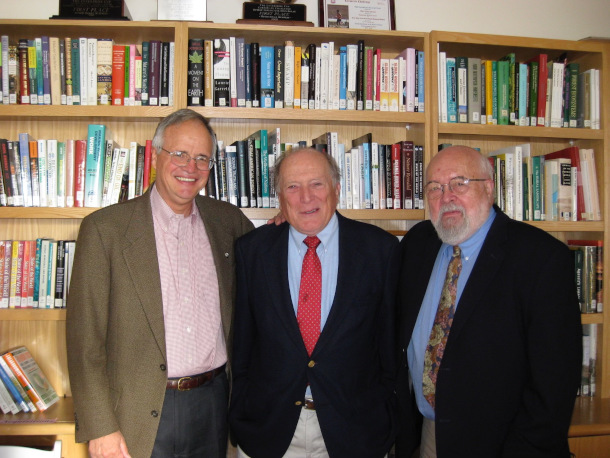
(Left to right) Gus Speth, George Woodwell, and Dean Abrahmson celebrate George’s 80th birthday in Woods Hole. (Photo: Courtesy of Gus Speth)
CURWOOD: George Woodwell, of all the things you've worked on over the past years, what do you feel was the most important? Where do you feel you really made the biggest difference?
WOODWELL: Well, I'm not sure I've made any difference, but I've been very fortunate to work on a series of topics which have turned out to be great issues of environment. So, to the extent that the public realizes that they are great issues and that correcting them, turning them to human advantage requires fundamental changes in how we manage the world, and the responsibility for that is a core purpose of Government. Governments forget. In their enthusiasm for developing economic goods they forget that they have a fundamental responsibility to protect ecological integrity, and to the extent that the public realizes that I think we've made a contribution. I'm not sure that the intensity with which the public can realize that is going to be great enough to correct the trends at the moment, which an ecologist sees as thoroughly threatening.
[MUSIC: Utah Wind Symphony, "Triumphant Journey for Horn and Wind Symphony,” comp. Rick DeJonge, YouTube rehearsal performance from 2018: https://www.youtube.com/watch?v=SqyBSRv99ao]
CURWOOD: By the time of his death in 2024 at the age of 95, George Woodwell had inspired many people who became leaders in their own right. And in a montage we will hear some now, starting with Kiliparti Ramakrishna, an international lawyer who helped craft the UN Framework Convention on Climate Change. Also John Holdren, a Harvard and UC Berkely professor who served in the White House as Barack Obama’s science advisor, And Gus Speth who worked with George in the Carter White House and with him established the World Resources Institute. And Richard “Skee” Houghton, who started as a close research associate with George Woodwell sixty years ago and never left.
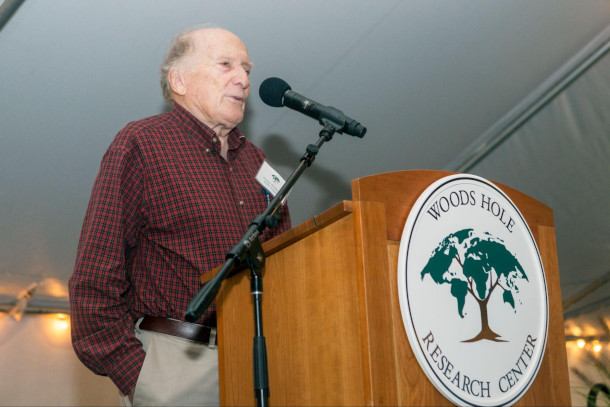
Dr. Woodwell speaks at the Woods Hole Research Center in 2018. (Photo: Courtesy of the Woodwell Climate Research Center)
RAMAKRISHNA: I considered him the ideal definition of a science diplomat.
HOLDREN: George was a brilliant scientist, first of all, but being a brilliant scientist was never enough for him. He wanted to be sure that the science he was doing and others were doing in related domains, got into the policy process, led to improvements in public decisions, and therefore led to a better world.
RAMAKRISHNA: Another thing that he was very fond of saying is that the role of the government is to define and defend public interest. And the question, of course, is how do you come to the conclusion and what's in public interest? And that is where he said, Well, you have to rely on science. And so that's where I think George stands out amongst all of his great luminary scientists colleagues that he has.
SPETH: You know, at that time, it was hard to be an outspoken scientist, this is, this is worth noting, because the scientists, you know, had their role in society as they perceived it. And it wasn't really to speak out on policy issues, it was just to make the science available. And there was no real serious effort to not only educate the public, but to draw out the policy implications. And over time that has changed in the scientific community has changed. And I give George a lot of credit for that, because he was a pioneer in making science policy relevant.
HOUGHTON: He liked to not just hand down orders, but he would have discussions with anybody involved. Even if he had thought about it, and he thought he knew the way to go, he liked to bring everyone on board, and he was not averse to changing his mind if he heard arguments to the contrary. He certainly had a mission. He had things he wanted to do. But he would, he would always have time to talk to you. He was authentically interested in you when he was having a conversation, and he could talk about anything.
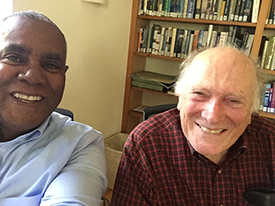
Living on Earth’s Executive Producer Steve Curwood interviewed George Woodwell at the Woods Hole Research Center (now the Woodwell Climate Research Center) in 2016. (Photo: Steve Curwood)
SPETH: We were devoted to George. I was devoted to George. He was steady as a rock. He was clear eyed and clear headed. He had a really good sense of humor, which made him a delightful companion. He laughed a lot, had a very positive spirit. He was always encouraging us young guys, when we were about 15 years younger, so George was almost a father figure.
RAMAKRISHNA: When the heat went out in my house, he came with his tools and then fixed it before I could call anybody else for help, and you know, this was a winter evening, but he's the one coming to my basement and then fixing the heating system, I mean, you know, where do you find somebody like that?
HOLDREN: We've all met people who were very smart, who were good scientists, who were collegial, who were warm hearted, who were optimistic, who were engaged in influencing the policy process in a very determined and effective way. But to have all that combined in one person made George Woodwell really exceptional.
CURWOOD: George Woodwell is gone now, but not forgotten, and as our planet wrestles with the climate emergency, his work will likely loom large in the annals of history. And we, and I include you, the listeners to Living on Earth, owe him a debt of gratitude for his clarity and his convictions. Thanks, George Woodwell, for your efforts to help make this a world to live in.
Related links:
- Listen to our 2023 interview with George Woodwell: A Call to Cool the Earth
- Listen to our 2016 interview with George Woodwell about his book A World to Live In
- Woodwell Climate Research Center
[MUSIC: Utah Wind Symphony, "Triumphant Journey for Horn and Wind Symphony,” comp. Rick DeJonge, YouTube rehearsal performance from 2018: https://www.youtube.com/watch?v=SqyBSRv99ao]
CURWOOD: Living on Earth is produced by the World Media Foundation.
Our crew includes Naomi Arenberg, Paloma Beltran, Kayla Bradley, Josh Croom, Jenni Doering, Daniela Faria, “Mehek” Gagneja, Swayam Gagneja, Mark Kausch, Mark Seth Lender, Don Lyman, Nana Mohammed, Aynsley O’Neill, Sophia Pandelidis, Jake Rego, Andrew Skerritt, and El Wilson.
Tom Tiger engineered our show. Allison Lirish Dean composed our themes. You can hear us anytime at L-O-E dot org, Apple Podcasts and YouTube Music, and like us, please, on our Facebook page - Living on Earth. We tweet from @livingonearth. And find us on Instagram at livingonearthradio. And you can write to us at comments at loe dot org. I’m Steve Curwood. Thanks for listening and Happy New Year!
ANNOUNCER: Funding for Living on Earth comes from you, our listeners, and from the University of Massachusetts, Boston, in association with its School for the Environment, developing the next generation of environmental leaders. And from the Grantham Foundation for the protection of the environment, supporting strategic communications and collaboration in solving the world’s most pressing environmental problems.
ANNOUNCER 2: PRX.
Living on Earth wants to hear from you!
Living on Earth
62 Calef Highway, Suite 212
Lee, NH 03861
Telephone: 617-287-4121
E-mail: comments@loe.org
Newsletter [Click here]
Donate to Living on Earth!
Living on Earth is an independent media program and relies entirely on contributions from listeners and institutions supporting public service. Please donate now to preserve an independent environmental voice.
NewsletterLiving on Earth offers a weekly delivery of the show's rundown to your mailbox. Sign up for our newsletter today!
 Sailors For The Sea: Be the change you want to sea.
Sailors For The Sea: Be the change you want to sea.
 The Grantham Foundation for the Protection of the Environment: Committed to protecting and improving the health of the global environment.
The Grantham Foundation for the Protection of the Environment: Committed to protecting and improving the health of the global environment.
 Contribute to Living on Earth and receive, as our gift to you, an archival print of one of Mark Seth Lender's extraordinary wildlife photographs. Follow the link to see Mark's current collection of photographs.
Contribute to Living on Earth and receive, as our gift to you, an archival print of one of Mark Seth Lender's extraordinary wildlife photographs. Follow the link to see Mark's current collection of photographs.
 Buy a signed copy of Mark Seth Lender's book Smeagull the Seagull & support Living on Earth
Buy a signed copy of Mark Seth Lender's book Smeagull the Seagull & support Living on Earth

